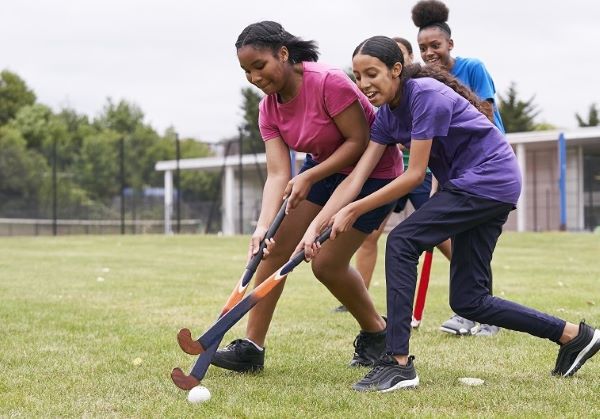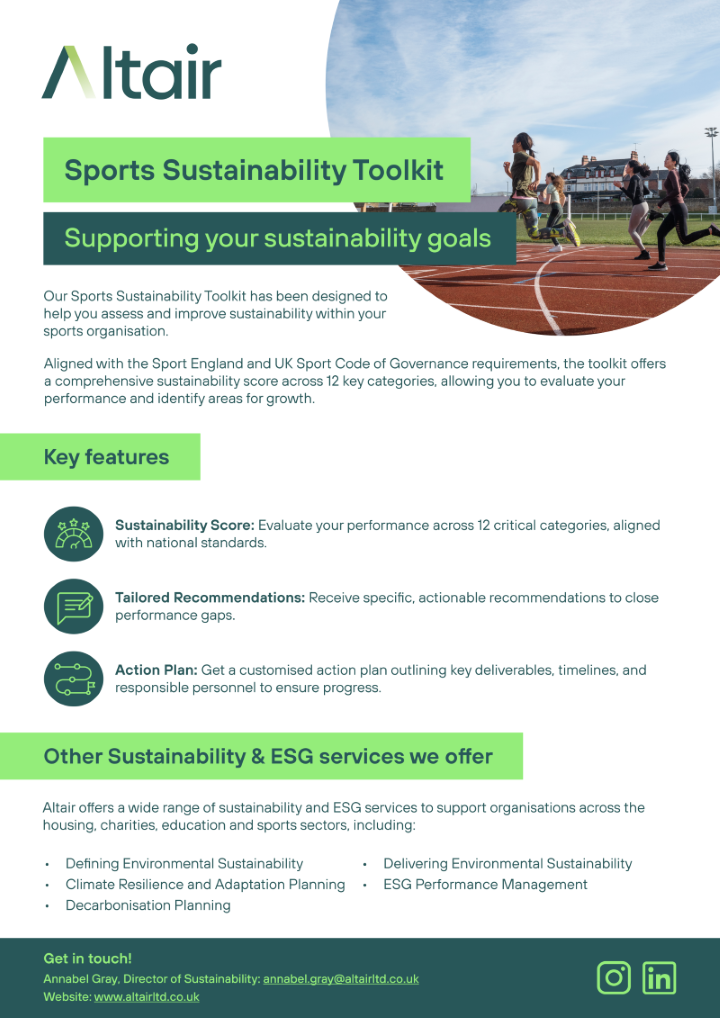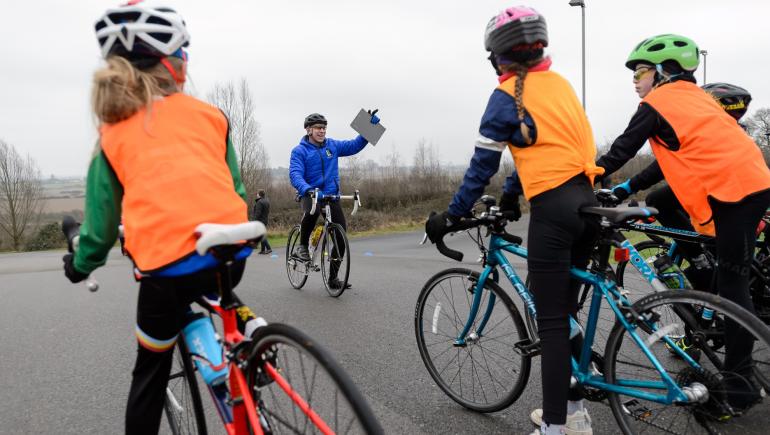 In 2025, ConnectSport will step up its work showcasing and sharing the contribution of sport to sustainable development and ESG (environmental, social, governance) priorities. In part one of this two-part article, Active Humber CEO David Gent, who is Chair of Active Partnerships’ Climate Crew, and Annie Gray, Director of Sustainability for Altair Ltd, talk about their priorities and hopes for the year ahead.
In 2025, ConnectSport will step up its work showcasing and sharing the contribution of sport to sustainable development and ESG (environmental, social, governance) priorities. In part one of this two-part article, Active Humber CEO David Gent, who is Chair of Active Partnerships’ Climate Crew, and Annie Gray, Director of Sustainability for Altair Ltd, talk about their priorities and hopes for the year ahead.
Hi both, thanks for speaking to ConnectSport. Firstly, please can you introduce yourselves and provide some background on your experience and expertise in sport and sustainability.
Annie: I am Director of Sustainability for Altair, the consultancy which specialises in helping socially-focused organisations in community impact, strategy and fundraising. My first exposure to sport and sustainability was at University when my dissertation focused on The Oval cricket ground and the carbon footprint of its various events. I moved into environmental consultancy in 2011, and worked in business transformation as I believe a lot of sustainability is about exactly that – and this has been very useful throughout my career. Later on I worked for the company which built the athletes’ village at the London Olympics, and have been with Altair since 2018. I set up our sustainability and ESG practice back in 2020 and more recently have been working with our Director of Sport, Emma Atkins, and the team looking at how sport and sustainability come together. So as a big sports fan and a big sustainability fan, it’s an area I am really passionate about!
David: I am the CEO of Active Humber and also represent Active Partnerships at a national level on a number of different environmental sustainability forums, both within and outside of sport – for example with Sport England and DCMS. The Humber area alone produces 37% of the UK’s industrial carbon emissions, so if we are going to solve the climate crisis then it has to be solved in part in the Humber, and my focus is how and where can sport and physical activity offer some solutions. Secondly, the Humber is the second most inactive place in England and when you look at Sport England’s Active Lives data and then the areas producing the most carbon emissions, it is interesting how they line up. There is an inextricable link between environmental sustainability and societal inequalities, and the role that sport and physical activity can play in addressing both.
Over recent years we have heard a lot more about sport and its carbon footprint. What do you think is the reason for this?
David: I think generally amongst players, coaches, volunteers, administrators or whoever, they are all human beings and you can’t not notice there is a climate crisis. So irrespective of sport, there is much more general awareness of it, and then in the news – particularly around elite sport whether that’s the Rugby World Cup or the Olympics – there are lots more stories around this subject. Then you have climate activists, and whether you agree with them or not, they have been using sport to amplify their message because it is such a powerful tool to tell that story. Here in the Humber, each one of our local areas is facing up to real local challenges whether it is poor housing or lack of green space. So it’s all becoming much more unavoidable and the sports sector is part of that. Finally, we are all passionate about our sport and our activities, and we don’t want them to be lost or damaged – whether that’s a ruined playing schedule or season, or polluted waters, or whatever, so we are all really waking up to how it is impacting how we play, or how we wish to play.
Annie: Globally it has all gained momentum with the likes of Greta Thunberg since 2018 and it’s crazy to think how someone, who was 14 or 15 at the time, has really shone a light on the issue and we are all thinking about how we take action around what is happening. Recently I was also thinking about when we hosted the London Olympics in 2012 and how they had a vision for a Zero Waste Games, and since then other host nations have tried to replicate that. Whether they have been successful or not is arguable, but they have been watched worldwide which has helped to build momentum and make others think about what they can do, even if it’s not around a big event like that, at club level for example. People are now thinking about what can we do locally? Can we share lifts to a sports match, can we walk to the venue, could we think more about recycling at that venue?
Much of this awareness is at elite or the top level of sport, for example the Olympics and Paralympics. How can we drive greater awareness at community or grassroots level, as well?
Annie: I think there are a few angles to this. Firstly, it’s about promoting programmes like the Carbon Literacy Project within the sports sector, and making sure it’s being used at all levels. What is powerful about this project is that it gets organisations of all sizes to take ownership, and not rely on a third party to run training. Its ‘train the trainer’ approach is going to be really important if it is going to be financially sustainable for organisations to do in the future.

Secondly, there is a massive role for elite level sports organisations to lead from the top. If they aren’t doing it, then how can we ask smaller organisations and community groups to follow suit? For those organisations with fewer resources, it can feel like a daunting task but it’s about breaking it down bit by bit. We want them to feel they can respond in a proportionate way to their particular risk and impact areas, and not just try to spread themselves too thinly across a wide variety of projects. Sustainability is a wide subject and you can easily cover at least 50 topics within it, but for a grassroots club it might mean initially focusing on one or two areas. It doesn’t have to be everything all at once.
Finally it’s about trying to bring to light what the role that all the different actors within the club or organisation can play, so for example what roles can the athletes or the committee members play? Could the club captain shine a light on how a policy, which may at first seem quite generic, actually converts in to the role you specifically have at the club? Too often people are left to read environmental policies and are left thinking ‘what does this actually mean to me?’ Communication is vital around how we bring it to life for different actors within organisations.
David: I think we could be using the elite athletes more to talk about the places where they learned how to become elite athletes – so the clubs, leagues and communities where they used to go and play. What has been the impact of climate change on those places? In future there won’t be elite athletes coming through if those places don’t exist any more, or are damaged. Elite athletes have tremendous power to cut through and people want to hear what they are saying. I also think there’s a role for the likes of Sport England, with its System Partners, to explain the connection between the climate threat, and how it shows up in our sport and physical activity. If you look at rugby league and union across the UK, they have both had their seasons truncated and they won’t get those matches back, so how do we cope and tell that story?
Annie: I also think there is a partnership role for elite sports clubs or organisations where they could share tools or tips, templates and training packs which perhaps smaller organisations just don’t have the capacity to create. This is something that the housing sector does well, particularly in Wales, and is quite open and transparent about it. It doesn’t make sense for five of us to be buying in a third-party service when we all need the same thing, so why doesn’t one of us just share it? It’s a practical point about some of the clubs sharing some of the good work they have already done with others who don’t have the resources to do it yet.
Read part two 'Unlocking the benefits of an effective ESG strategy'.
Read about Active Partnerships' new Environmental Sustainability Commitment.
To find out more about how Altair Ltd can support your organisation, access the Sports Sustainability Toolkit and complete the Expression of Interest form or email emma.atkins@altairltd.co.uk











